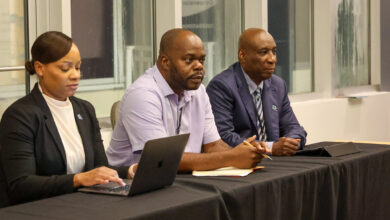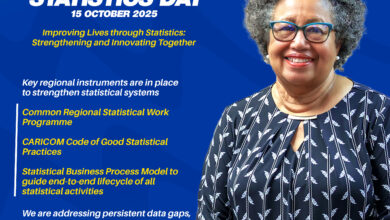Madam Chair, although the protocol has already been established, please permit me to recognize His Excellency, the Most Honourable Sir Patrick Allen, the Governor General of Jamaica and Lady Allen, our distinguished Host and Chairman of CARICOM Honourable Bruce Golding, our Distinguished and Honoured Guests especially those who have travelled from overseas, friends, Ladies and Gentlemen.
Esteemed Colleagues: Conferring, planning, and working with you on matters of import to our Region has always been a source of great collaborative energy and productivity. As a result, these Heads of Government meetings have always represented highly valued opportunities for shared insights and analyses. In light of this, therefore, I am especially pleased – and grateful – that the people of St. Kitts and Nevis, on January 25th of this year, very warmly arranged for my now-15 year collaboration with you, as CARICOM Heads of Government, to continue.
Since our last meeting, of course, the people of Montserrat and the people of Trinidad and Tobago and Suriname have been to the polls as well, and so I take this opportunity to once again to express, on behalf of the Government and people of St. Kitts-Nevis, and also on my own behalf, sincere congratulations and best wishes to the Honorable Reuben Meade, Honourable Hubert Hughes, Honourable W. Mckeeva Bush, Chief Ministers of Montserrat, Anguilla and the Cayman Islands respectively and the Honorable Kamla Persad-Bissessar, Prime Minister of Trinidad and Tobago. I know that we all wish you, your Governments, and the people you now lead, the very best.
Honourable Colleagues: When we entered the political arena, whenever each of us individually may have entered the political arena, we knew that we would face a plethora of economic, social and cultural challenges – if we were ever granted the opportunity to lead our respective islands and/or nations. That is why we sought elected office, after all – to solve problems….to leave our countries better than we found them…..
Today, however, I am certain that all of us in this room, like Heads of Government the world over, would agree that we are now facing challenges that are vaster in scope, more demanding in complexity, and more varied in their respective component parts than any Head of Government, anywhere in the world, could have predicted just one decade ago.
It is at times like these, then, when the resolve of our leadership, the resolve of our people and Governments are tested. It is at times like these, then, that our collective efforts as people within our countries, as varying sectors within our countries and as countries within this beloved Caribbean Community of ours must be brought to bear. It is at times like these, then, that we must understand that the difficulty of the task at hand requires a sustained commitment, as building our Community is a never ending task.
There is no denying that we, in the Caribbean, now find ourselves in what might best be described as several “tight spots” – most of them not of our making. But that, at this point, is irrelevant.
The moment demands that we now use all tangible and intangible resources within our reach to extricate ourselves, and that we do so via the formulation of corrective, and I believe importantly, collective action and policies at this most pivotal moment in human – and Caribbean – history.
Our “tight spots” are by no means inconsequential. Indeed, they have been wreaking havoc with nations far more powerful than ours. We, nonetheless, must be resolute in our efforts to (i) anticipate the implications of these global crises, (ii) insulate our countries and region, to the best of our abilities, from the associated fallout, and (iii) educate our people on the responsibilities that we must now all shoulder – Governments, private sectors, Churches, NGO’s, and ordinary civilians alike – in the interest of self-preservation.
Esteemed Colleagues, we all agree that this increasingly interconnected world has its advantages – but it certainly has its costs as well:
The global economic crisis was not of our making, but it is now very much our problem.
Global climate change, also not of our making, is now of supreme relevance to us, located as we are, between the Tropic of Cancer and the Tropic of Capricorn – with all that, that implies in terms of altered weather patterns, and their attendant socio-economic consequences.
The unthinkable catastrophe in the Gulf cannot be charged to either our policies or our actions, yet it is already of profound and immediate concern to certain CARICOM member states. Indeed, though of currently indeterminate immediate impact where the rest of us are concerned, this catastrophe will, ultimately, have ramifications for us all.
The global disintegration of traditional cultures was not instigated by us, yet it has grave implications for our region, as is now evident in the very “un-Caribbean-like” attitudes and behaviors that have crept into the region, and the attendant increases in violence and criminality with which we must now contend. My very own country of St. Kitts and Nevis has not escaped the wrath of this great challenge, however I have not been daunted. Today I say to my colleagues, especially those we are welcoming at this 31st Regular meeting that you too must never become daunted.
I have had the distinct honour of being a member of this forum for the last fifteen years. In fact today makes it exactly 15 years since I have been Prime Minister of St. Kitts and Nevis and my party’s victory of January 25, 2010 marked the start of the fourth Consecutive time of my Prime Ministership and the St. Kitts and Nevis Labour Government. I have experienced some of our greatest challenges but I have seen very significant achievements in response to these challenges.
Distinguished Heads of Caribbean Governments, Ladies and Gentlemen during my sojourn as a leader within this Community we have together made significant steps forward.
It should never be underestimated, the privileges we have given to our Caribbean people and businesses to venture out into our different Caribbean islands under the free movement of people and of capital within the context of the CSME. It should never be underestimated, the framework that we have put in place to ensure that our interests are best served in external trade negotiations through the relevant Prime Ministerial Subcommittee and the CRNM. It should never be underestimated, the many benefits that can be derived from our coordinated approach to regional health issues of a global and epidemic nature within the context of our regional health policy.
In this regard our focused initiatives through Caribbean Cooperation in Health, PANCAP and the now Caribbean Public Health Agency (CARPHA), at mitigating the effects of HIV/AIDS and chronic non-communicable diseases must be celebrated.
Lastly, we must never underestimate how well we have done at keeping the University of the West Indies as the centre of our regions education strategy. Its expansion into several spheres, but especially the Open Campus establishment and the great numbers of our Caribbean people that it continues to educate must be celebrated.
These are significant achievements that we have attained together and it’s these outstanding achievements that give me faith and confidence in our collective commitment. These successes are what give me equal faith that we will rise above the challenges our countries now face as long as we continue to work seriously together.
It is very important for me as we move forward to remind us all that there is a very sterling example of greater cooperation right in our midst. On 19th June a significant statement was made when the Heads of Government of the OECS territories signed the Revised Treaty of Basseterre establishing the OECS Economic Union. This great stride made at the sub-regional level of the Organisation of the Eastern Caribbean States must be seen in the context of the wider integration movement and we should not as the Caribbean Community hesitate to use this model as instruction to us in this integration movement onward and forward.
In closing I wish to thank, profoundly those who have served us in the past, their work has been well received and engenders the platform on which we must now develop and advance. I give an equally profound thank you to the Secretariat who continues to work diligently as the implementation agency of the Community. An even more profound thank you is reserved for the Caribbean peoples we serve for their vote of confidence in our leadership, for their patience and for their insistence on demanding only the best from their leaders.
It is, indeed, a signal honour for us to be the elected leaders of the Caribbean Community in 2010. We must remember however that attending to the fierce challenges we face, Fellow Heads of Government, Ladies and Gentlemen, will demand sacrifice by all….self-restraint by all…courage and sobriety by all. And any people’s ability and willingness to meet these types of challenges is directly related to the strength and stability of that people’s culture. Caribbean values have equipped our people to rise to history’s challenges before.
Therefore through a renewed and sustained emphasis on traditional standards and behaviours that elevate and empower, let us equip our Region, not only to meet our current challenges, but indeed to re-assert and re-claim our Caribbean identity, and in the process, equip ourselves to meet challenges life – and Fate – may bring.
Thank you!





